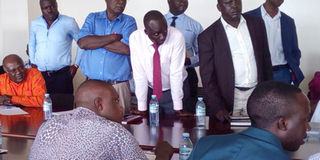Varsity staff trade blame as State House investigates 8 over graft

Probe. Soroti University staff appear before the State House Anti-Corruption Monitoring team over alleged misappropriation of Shs5.3b. PHOTO BY SIMON PETER EMWAMU.
What you need to know:
- Col Nakalema warned that every public resource should be utilised in accordance to the work plan. She requested for work plans for financial year 2018/2019, and all evidences of transactions, adding that her team will probe staff accused accordingly.
Soroti University staff on Wednesday engaged in counter accusations before the State House Anti-Corruption Unit team that is investigating eight of them over alleged misappropriation of Shs5.3b.
The Shs5.3b was a supplementary budget advanced to Soroti University last financial year to facilitate academic projects.
The new university opened for its academic operations in August with 94 pioneer students, making it the 9th government run university.
The meeting chaired by the head of the unit, Lt Col Edith Nakalema, turned rowdy as accounting heads blamed each for the misappropriation of funds.
The key allegations of fraudulent transactions that were read out by Lt Col Nakalema revolved around the multi-million sewerage tender that was awarded to an associate attached to an insider against the advice of the procurement officer, alleged soliciting of a bribe from the contractor by the deputy vice chancellor, who also doubles as contracts committee chairperson, and Shs160m allegedly paid as legal fees.
Others are Shs53m used to purchase phones outside the work plan for the university, Shs46m in travels abroad without the approval of the university council, Shs18m for alleged procurement of seedlings that were delivered by National Forest Authority for free, Shs15m paid out to four university staff in allowances to attend a private procurement symposium in Kampala, which was not budgeted for even when Ministry of Finance ruled against the intended request.
Mr John Robert Ikoja, the Vice Chancellor of Soroti University, said some transactions were done against his advice, citing the payout of more than Shs15m in working allowances for workshops, and the trip to Morocco that cost Shs46m, which he said happened while he was away on leave.
“Issue of sewerage contract for sanitation purposes, when I came back from leave, I was told there was a problem, in such instance, the university secretary in future should strike off all those in such dubious projects for the sake of transparency,” Mr Ikoja said.
He added that the university requested for Shs5.3b in order to procure equipment for the medical school, which National Council for Higher Education had set a condition, if the university was to be granted permission to work. Mr Ronald Odongo, the senior procurement officer, claimed that he ruled against the sewerage contract but the university secretary, Mr Samuel Omoding, deputy vice chancellor Lawrence Tokema and junior procurement officer Hudson Areeba awarded the contract to an associate of an insider even when there was no open bidding done. He added that citing breach of the procurement rules, he wrote to the Solicitor General who also ruled against the project, but the three did not heed his advice.
Mr Tokema is also accused of soliciting a bribe from a contractor awarded a tender to install lifts.
He, however, refuted the allegations saying there is no standing contract on sewerage system .
“I have served this government for long, the money was simply a per diem as per the agreement for us to go to China with the contractor. I later refunded the money on learning it was a trap being used,” he said.
On the purchase of phones at Shs53m and greening of the university, Mr Tokema, said, the two activities had been planned for.
Mr Samuel Omoding, acting university secretary, said he is being undermined by staff attached to the interdicted university secretary.
“Under normal circumstances , I wouldn’t have approved payments for some projects, but we were in a fix, there was a supplementary budget to be spent, and the financial year was drawing to a close. We even had to go for bank guarantee’s for some of the contractors to be sure they will accomplish work,” he said.




